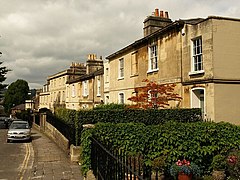Lyncombe, Bath
| Lyncombe | |
|---|---|
 Lyncombe Hill |
|
|
Lyncombe shown within Somerset
|
|
| Population | 5,505 (2011.Ward) |
| Unitary authority | |
| Ceremonial county | |
| Region | |
| Country | England |
| Sovereign state | United Kingdom |
| Post town | BATH |
| Postcode district | BA2 |
| Dialling code | 01225 |
| Police | Avon and Somerset |
| Fire | Avon |
| Ambulance | South Western |
| EU Parliament | South West England |
| UK Parliament | |
Lyncombe is a district and electoral ward in Bath, Somerset, and a former parish in the Diocese of Bath and Wells. In the mid-19th century the parish was formed when the parish of Widcombe and Lyncombe was split in two, but it was abolished in the late 1960s. The village of Lyncombe existed since at least the Saxon period prior to becoming part of the City of Bath.
Lyncombe takes its name from the Celtic word cwm meaning valley, with the Lyn being the name of the stream that runs through it. The present day district is approximately centred on the Western part of this valley, known as Lyncombe Vale, and extends down to the more urban area around the River Avon across from Bath Spa railway station. The northern area of the electoral ward is known as Bear Flat.
The Manor of Lyncombe was ecclesiastical property from the time of Osric, king of the Hwicce in the 7th century to the Norman Conquest. A charter of the City of Bath records that in 970 King Edgar "granted ten hides at Cliftune (i.e. Lyncombe), near Bath, Somerset, to St Peter's church, Bath, in return for 100 mancuses of gold and ten hides at Cumtune (possibly Chilcompton or Compton Dando, Somerset)."
The Domesday Book showed that in 1066 Sæweald Abbot of Bath, held 10 hides in Lyncombe. In 1086 this land was held by Ælfsige, his successor. Following the death of William the Conqueror the Burgh of Bath, including Lyncombe Manor was sold by his son, William Rufus to John of Tours, Bishop of Wells who moved the bishopric to Bath.
...
Wikipedia

